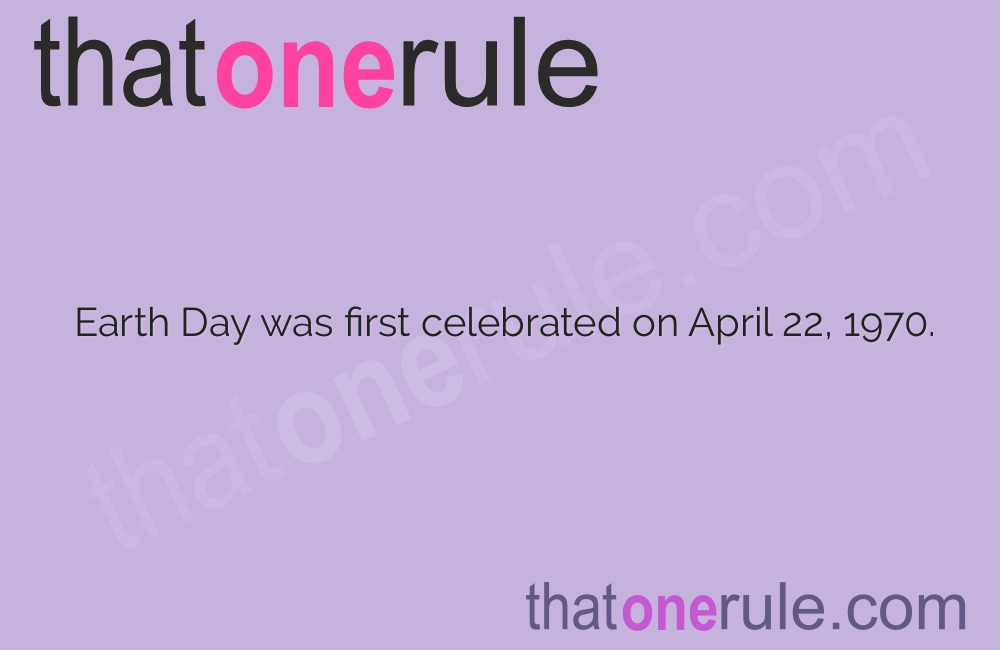Amazing Facts About Earth Day

Earth Day was first celebrated on April 22, 1970.
Earth Day is celebrated in more than 193 countries around the world.
The idea for Earth Day was inspired by the devastating oil spill in Santa Barbara, California in 1969.
More than 1 billion people participate in Earth Day activities every year.
Earth Day is considered the largest secular observance in the world.
Earth Day is a day for raising awareness about environmental issues and promoting sustainability.
The Earth Day flag is made up of a blue background with a drawing of the Earth in the center.
The Earth Day symbol is a combination of the Greek letter theta and an equal sign, representing balance and harmony.
Earth Day helped to inspire the creation of the Environmental Protection Agency (EPA) in the United States.
Earth Day activists played a major role in the banning of the pesticide DDT in the United States.
Earth Day celebrations often include tree planting, clean-up campaigns, and educational events.
Earth Day is a time to reflect on the impact of human activity on the planet and find ways to mitigate it.
The first Earth Day led to the passage of numerous environmental laws, including the Clean Air, Clean Water, and Endangered Species Acts in the United States.
Earth Day inspires individuals to make positive changes in their daily lives to reduce their carbon footprint.
Earth Day encourages people to embrace renewable energy sources like solar and wind power.
Amazing Facts About Earth Day part 2
Earth Day is a reminder that every individual has a responsibility to protect and care for the planet.
Earth Day serves as a platform for raising awareness about climate change and pushing for action to address it.
Earth Day celebrations often include art installations made from recycled materials.
Earth Day gives a voice to indigenous communities who have been at the forefront of environmental conservation for centuries.
Earth Day reminds us of the interconnectedness of all living things and the importance of biodiversity.
Earth Day celebrations often involve workshops on sustainable living and eco-friendly practices.
Earth Day provides an opportunity to learn about endangered species and what can be done to protect them.
Earth Day events often include musical performances and cultural celebrations to engage and entertain participants.
Earth Day serves as a reminder that our planet is unique and worth preserving for future generations.
Earth Day allows individuals to connect with nature and appreciate the beauty of the natural world.
Earth Day celebrations often include beach clean-ups to help protect marine ecosystems.
Earth Day promotes the use of public transportation and carpooling to reduce greenhouse gas emissions.
Earth Day encourages individuals to reduce, reuse, and recycle to minimize waste and conserve resources.
Earth Day events provide a platform for environmental advocacy groups to raise awareness about their causes.
Earth Day is a time to reflect on the importance of sustainable agriculture and responsible food consumption.
Earth Day serves as a reminder to support businesses and organizations that prioritize sustainability.
Earth Day events often include outdoor activities like hiking, biking, and nature walks to celebrate the beauty of the Earth.
Earth Day encourages individuals to switch to energy-efficient appliances and light bulbs.
Earth Day inspires people to get involved in community gardens and urban farming initiatives.
Earth Day celebrations often include vegan and vegetarian food options to promote sustainable eating habits.
Earth Day serves as a reminder to appreciate the role of forests in carbon sequestration and biodiversity conservation.
Earth Day events often feature educational booths where participants can learn about environmental research and initiatives.
Earth Day encourages individuals to support local farmers and buy organic, locally sourced produce.
Earth Day events often feature interactive displays on renewable energy technologies like solar panels and wind turbines.
Earth Day serves as a platform for environmental justice advocates to raise awareness about the disproportionate impact of pollution on marginalized communities.
Earth Day encourages individuals to conserve water by taking shorter showers and fixing leaks.
Earth Day events often include discussions on sustainable urban planning and the importance of green spaces in cities.
Earth Day serves as a reminder to properly dispose of hazardous wastes like batteries and electronics.
Earth Day encourages individuals to support legislation and policies that protect the environment and promote a sustainable future.
Earth Day celebrations often include environmental film screenings to educate and inspire participants.